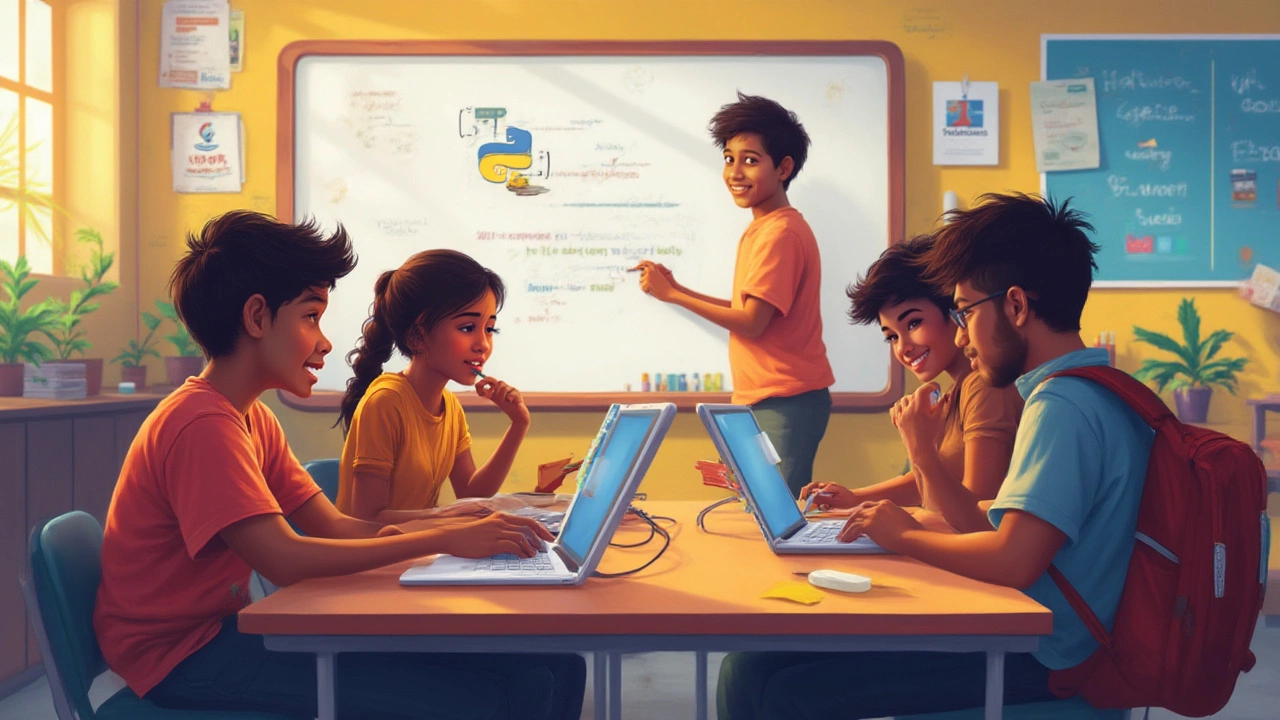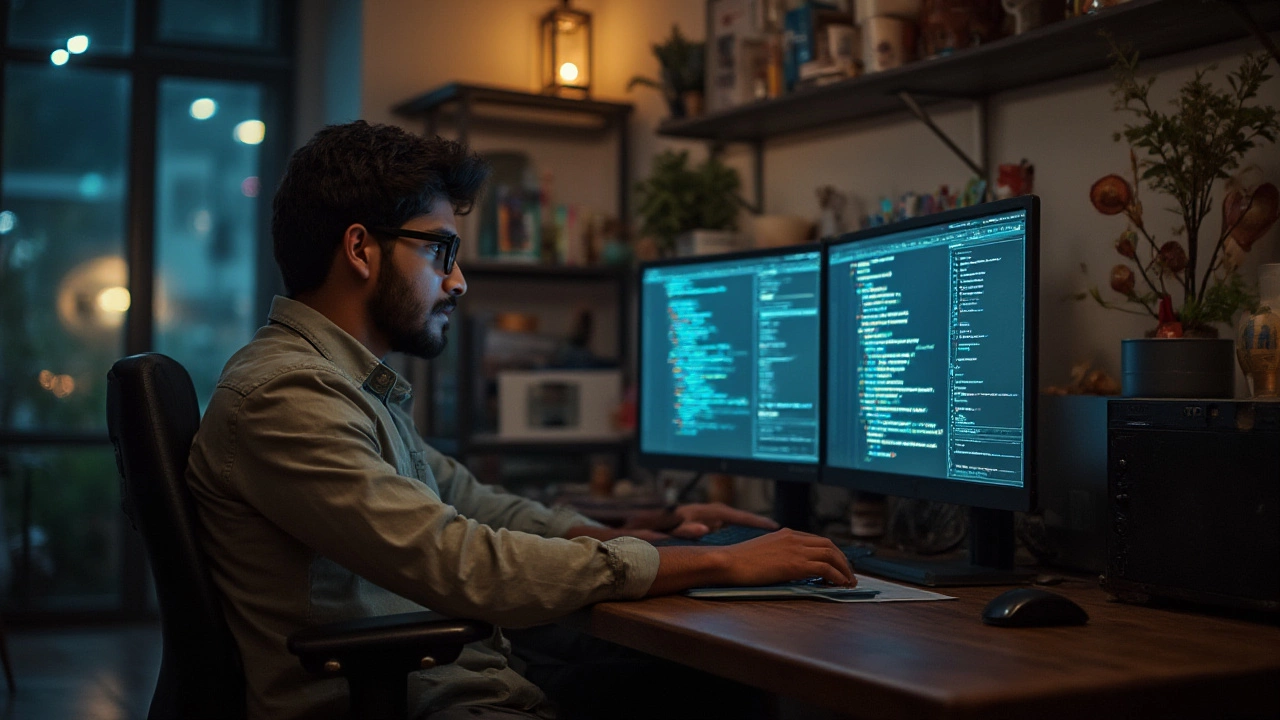Picture this: three years ago, a teenager in a small Indian town made an app that solved his neighborhood's water shortage problem. He never attended a fancy coding bootcamp. All he had was YouTube, Stack Overflow, and bags of determination. Now, he’s interning at a major Indian startup. Sounds wild? Actually, stories like his aren’t rare anymore. More and more people are jumping into programming on their own—without college degrees, without expensive courses, sometimes without any math skills to brag about. But can you really teach yourself to code? Or is that just a myth tech bros like to tweet about? Here’s the real deal.
Breaking Down the Myth: Who Can Learn to Code?
The old stereotype says coders are math wizards or child prodigies glued to their screens from toddlerhood. But walk into any developer meetup these days and you’ll find ex-teachers, graphic designers, or even stay-at-home parents who picked up programming later in life. According to a 2023 Stack Overflow Developer Survey, almost 71% of developers say they used online resources or were self-taught, at least in part. And here’s a stat that surprises many: only about 38% of professional developers globally have a formal computer science degree.
What makes this possible? Let’s get blunt—coding, at its core, is just a way to tell computers what to do, step by step. If you’ve ever followed a recipe or sorted your music playlist, you’re already thinking in “algorithms.” Sure, some languages and concepts seem alien at first. But just like learning to ride a bike, what feels impossible in the morning gets easy by lunchtime if you stick with it.
Your journey will be unique. Some pick up Python in weeks; others take months to get comfortable with JavaScript. Age isn’t a barrier—many have started learning coding well into their forties, fifties, or beyond. And if attention span or learning style concerns you, rest easy. Today, you’ll find everything from quick mobile apps like Mimo or Sololearn for bite-sized practice to full video walkthroughs on YouTube, complete with humor, visuals, and explanations that feel like a friend explaining over coffee rather than a lecture hall bore.
Skeptics say “you have to be good at math.” But let’s get real: for most programming tasks—especially web development, data analysis, and automation—basic arithmetic, logic, and some patience will suffice. Building a website or automating a spreadsheet rarely needs calculus or algorithms only statisticians enjoy.
Here’s a fun fact: Elon Musk famously taught himself to code at age 12 to build a video game. But for every Musk, there’s a regular person who simply wanted to build a personal website, fix up a business process, or automate their resume submissions—no galaxy-brain IQ required.

The Truth About Teaching Yourself: Tools, Tactics, and Pitfalls
Let’s get practical. If you want to teach yourself to code in 2025, you have hundreds of free and paid options.
- Free online courses: Harvard’s CS50 and MIT’s OpenCourseWare are huge favorites worldwide. Platforms like freeCodeCamp let you learn hands-on—build real stuff right from the browser.
- YouTube tutorials: Channels like Corey Schafer (Python), Traversy Media (web), and The Net Ninja (JavaScript) are goldmines. You see the process, hear the explanations, and pick up tips pros use daily.
- Practice websites: Exercism, HackerRank, and LeetCode give you thousands of challenges to try, from beginner “Hello World” to crazy algorithm puzzles.
- Community support: Stack Overflow, Discord servers, and subreddits like r/learnprogramming offer quick answers and emotional support when you bang your head against a stubborn bug at 2AM.
- Interactive apps: Mimo, Grasshopper, or Sololearn help if you’d rather learn on your phone while waiting for a bus or during a lunch break.
The key is picking a path and sticking to it for a while. Switching languages and jumping courses too soon is a classic mistake that slows down progress. If you start with Python, don’t rush off to learn Rust or Swift after a week unless there’s a clear reason.
Consistency beats intensity. It’s better to code for 30 minutes a day than for 4 hours one Saturday and then nothing for a month. Throw in some fun side projects—can you automate your daily to-dos, design a simple personal site, or tinker with game development? When the code does something you actually care about, you’ll stick with it longer.
But don’t expect a magic elevator to success. You’ll run into walls—syntax errors, things that don’t work, explanations that seem written in another language. Here’s a secret: seasoned coders still Google “How to reverse a list in Python” every so often. Navigating docs, searching forums, and experimenting with “what happens if I do this?”—those are the real developer skills.
A common pitfall is trying to study without building anything real. Tutorials are great, but the “tutorial hell” trap will keep you moving from course to course without ever writing something unique. Start your own projects, no matter how small or silly. It’s the difference between reading grammar books and actually speaking a language with friends.
Here’s a table showing how much beginner-friendly resources have exploded in recent years:
| Year | Number of Major Free Coding Sites | YouTube Coding Channels (100K+ Subs) |
|---|---|---|
| 2015 | 6 | 15 |
| 2020 | 20 | 40 |
| 2025 | 37 | 87 |
This flood of resources might seem overwhelming, but it’s actually great news. No matter your schedule, budget, or learning style, there’s something for you.
Don’t ignore the motivation slump though. Coding can be fun, but sometimes you’ll stare at a blank editor for hours. Share your journey—post your wins and frustrations online. Maybe find a study buddy or join a local coding group. Seeing others struggle and succeed keeps you grounded.
If you want structure but can’t cough up for a bootcamp, try making a personal curriculum. List the basics (like HTML, CSS, and JS if you like web, or Python for data and automation), then add projects (like a calculator, a todo app, or data scraper), and sprinkle in some algorithm practice every week.

Results and Expectations: What Happens When You Stick With It?
You might wonder, “How long until I feel like a ‘real’ coder?” There’s no single answer. Some say it takes 3-6 months to feel comfortable with basics if you practice regularly. To tackle more advanced stuff (think building serious apps or prepping for developer interviews), a year isn’t unusual. But progress isn’t a straight line. Some weeks the pieces fall into place; others you’ll get stuck and want to chuck your laptop out the window.
You’ll reach little milestones sooner than you think—like building your first working website, fixing a bug after hours of trial, or contributing to an open-source project. Celebrate each one. It means you’re levelling up.
If you’re looking to switch careers, there are now companies hiring self-taught coders in droves, sometimes valuing projects and portfolios over fancy degrees. In fact, a recent LinkedIn survey showed that nearly 30% of junior developer roles listed "portfolio projects" as a top hiring factor, not certificates.
Now’s a killer time to get into coding as industries across the board keep racing towards automation and digitization. Tech skills are spilling into every job role—not just in software companies, but in NGOs, fashion, sports, and even farming. Learn to code and you suddenly unlock a layer of power to solve problems, automate boring stuff, and maybe create a second income stream with freelancing or side gigs. Just look at the explosion of SaaS tools and no-code platforms; those who know a bit of coding can tune, extend, and fix things that others can’t.
That doesn’t mean you have to become a full-time developer. Many who learn coding use it alongside their main skill—an HR manager automates payroll, a marketer scrapes websites for leads, a small store owner builds a simple site. Coding is a multiplier, not just another job label.
What about burnout? The “hustle culture” myth says you need to crank out 12-hour marathons, but studies show those who pace themselves do better. Take breaks, celebrate tiny wins, and don’t compare yourself to others. Learning to code is like hitting the gym—it’s a long-term gain, not a one-week transformation.
One thing to watch for: don’t wait until “you know everything.” Apply for internships, freelance gigs, or even entry-level tech roles after you have a handful of projects to talk about. One memorable Reddit post in 2024 showed a guy landing a support engineer job after showing an HR manager a chatbot he built in his spare time. It was rough and had bugs, but his DIY spirit and willingness to learn got him the gig.
Your coding journey won’t be perfect. There’ll be late nights doubting if you’ll “ever get it” and early mornings thrilled that a stubborn piece of code finally works. Stick with it, and you might look back a year from now with real pride—and a project, app, or maybe a whole new job to show for it.







0 Comments